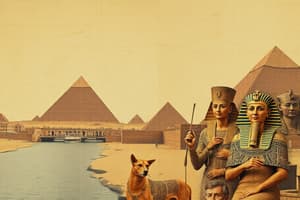Podcast
Questions and Answers
What type of texts did wealthy boys study in school?
What type of texts did wealthy boys study in school?
'Wisdom texts'
Where did many Egyptian students aim to work in the future?
Where did many Egyptian students aim to work in the future?
Royal palace, temples, army, government positions, tax collection, or practicing medicine with priests
What did middle-class families often send their sons for?
What did middle-class families often send their sons for?
Apprenticeships to learn crafts or special skills
How long did Egypt's civilization last?
How long did Egypt's civilization last?
Who did Cleopatra form an alliance with to protect Egypt's independence?
Who did Cleopatra form an alliance with to protect Egypt's independence?
What role did the Nile River play in ancient Egyptian civilization?
What role did the Nile River play in ancient Egyptian civilization?
Who were the powerful leaders in ancient Egypt believed to be part king and part god?
Who were the powerful leaders in ancient Egypt believed to be part king and part god?
Which famous Pharaoh of the New Kingdom was known for his intact tomb discovered in 1922?
Which famous Pharaoh of the New Kingdom was known for his intact tomb discovered in 1922?
What were some of the subjects included in the formal schooling of royal children in ancient Egypt?
What were some of the subjects included in the formal schooling of royal children in ancient Egypt?
What were the social classes in ancient Egypt, from the highest to the lowest?
What were the social classes in ancient Egypt, from the highest to the lowest?
Flashcards are hidden until you start studying
Study Notes
- Ancient Egypt, known for famous sites like the Pyramids at Giza, lasted for thousands of years and had a lasting influence.
- The Nile River played a crucial role in the success of ancient Egyptian civilization, providing water, transportation, and fertile soil for farming.
- The timeline of ancient Egypt spans over thousands of years, with distinct periods such as the Predynastic Period, Archaic Period, Old Kingdom, First Intermediate Period, Middle Kingdom, New Kingdom, Third Intermediate Period, and Late Period.
- Pharaohs were powerful leaders believed to be part king and part god, with dynasties ruling Egypt for generations.
- Tutankhamun, a famous Pharaoh of the New Kingdom, became king at a young age and was known for his intact tomb discovered in 1922.
- Ancient Egyptians had elaborate beliefs about the afterlife, with rituals involving preservation of the body, weighing of the heart against a feather, and passage to the Land of Two Fields.
- Social classes in ancient Egypt were well-defined, with royalty at the top followed by nobles, priests, soldiers, artisans, scribes, farmers, laborers, and slaves.
- Women in ancient Egypt had more rights compared to other ancient civilizations, being able to own property, sign contracts, and even become rulers.- Children of royalty in ancient Egypt, both boys and girls, received formal schooling in various subjects including writing, math, geography, cartography, science, ceremonial dance, and music. Women in royal families were also involved in government affairs.
- Wealthy boys attended school where they studied 'wisdom texts' focusing on literacy and practical information for their future careers.
- Many Egyptian students aimed for important jobs in the royal palace, temples, army, government positions, tax collection, or practicing medicine with priests.
- Middle-class families often sent sons for apprenticeships to learn crafts or special skills such as jewelry making, pottery, music, or weaving by living with a master and working for free.
- Egypt's civilization lasted for five thousand years, experiencing periods of peace, wealth, power, as well as war and decline. Cleopatra, the last ruler, formed an alliance with Julius Caesar of Rome to protect Egypt's independence but ultimately failed as the Romans took over Egypt in 30 BCE.
Studying That Suits You
Use AI to generate personalized quizzes and flashcards to suit your learning preferences.




